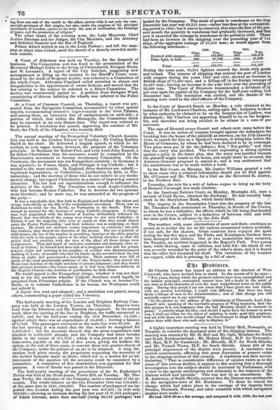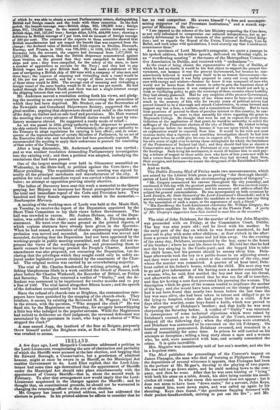Zbe Vrobinces.
Sir Charles Lemon has issued an address to the electors of West Cornwall, who have invited him to stand. In the course of it he says- " Ten years, during which the greatest reforms have been accomplished, and the boldest principles enunciated, cannot have left a doubt in the mind of any man as to the character of even the most insignificant actor on the public stage. During that period I am not aware that I have given one vote which, with my present knowledge, I would wish different. But there has been lately a change of men in the Administration; and of that change you will naturally expect me to say something. "In his answer to the address of the inhabitants of Plymouth, Lord John Russell said, speaking of the inevitable progress of Whig measures, that 'for this purpose it is not necessary that the late Ministry should be restored to power.' I entirely adopt his idea; and should I again have the honour to serve you, I shall set before me the object of assisting to make good this prophecy, and act with those who would compel the Government to adopt Liberal views, rather than with those who seek only to displace it."
A highly-important meeting was held in Trinity Hall, Newcastle, on Tuesday, to consider the depressed state of the shipping interest. The meeting was attended by Mr. M. Bell and Mr. Ogle, Members for North and South Northumberland ; Mr. Hodson Hinde, M.P. for Newcastle ; Mr. Hutt, M.P. for Gateshead ; Mr. Mitcalfe, M.P. for North Shields, and Mr. Twizell Wawn, M.P. for South Shields. About 200 of the principal shipowners of the district were present. A resolution was carried unanimously, affirming that great depression at present exists in the shipping interest of this country. A resolution was then moved, declaring, "That as considerable difference of opinion exists as to the cause of this serious decline, it appears to this meeting that a thorough investigation into the subject should be instituted by Parliament, with a view to the speedy amelioration and ultimately to the removal of the distress which now prevails." This was met by an amendment. Mr. R. Anderson, of South Shields, averred that the distress was attributable to the navigation-laws of Mr. Huskisson. To those he traced the change which had taken place in the carriage of the imports from Sweden, Denmark, Norway, and other countries with which navigation treaties were made— He took 1819-20 as a fair average, and compared it with 1839, the last year of which he was able to obtain a correct Parliamentary return, distinguishing British and foreign vessels and the trade with those countries. In the first period, the import-tonnage was—British ships, 935, 130,200 tons ; foreign ships, 957, 154,220 tons. In the second period, the entries inwards were— British ships, 840, 127,947 tons ; foreign ships, 3,954, 494,666 tons; showing a deficiency in British tonnage of 1 per cent, and an increase of foreign tonnage of 220 per cent. The returns of the exports to those countries showed that British manufacturers had not reaped the benefit that was expected from the change: the declared value of British and Irish exports to Sweden, Denmark, Norway, and Prussia, in 1820, was 106,5051.; in 1839, 554,1551.; or, taking Germany into the account, the exports had decreased from 7,877,993/. to 5,215,155/. He observed, that the British shipowner remonstrated against these treaties, on the ground that they were compelled to have British ships and men : they were compelled, for the safety of the state, to have a number of apprentices as recruits for the Navy; and they had to pay British wages and to give British food. Be had made a statement of the cost of navigating a British ship of 300 tons with a company of nine men and three boys; the expense of manning and victualling such a vessel would be 41. 18s. per ton per month, and for a voy age of three months the expense of those alone would be 2061. The average cost of manning and victualling a foreign vessel of the same burden would be 2/. 4s. per ton per month. He had looked through the British Tariff, and there was not a single interest except the shipping interest that was not protected. Mr. Anderson moved a resolution setting forth his views, and pledg- ing the meeting to use every exertion for recovering the protection of which they had been deprived. Mr. Straker, one of the Secretaries of the Newcastle and Gateshead Shipowners Society, supported the ori- ginal motion; arguing that shipowners should seek relief in the removal of the duty on timber and on salt-beef and provisions. Mr. Hutt warned the meeting that every advance of British duties would be met by reta- liatory measures abroad. He suggested a ready mode of relief— An act was passed in 1832, giving authority to the shipowner to provision his ship entirely from stores in bond. Unfortunately, the act gave authority to the Treasury to adopt regulations for carrying it into effect ; and, in conse- quence of the representations of certain Members of Parliament, by an act of the Executive that wise and beneficial law had been practically repealed. He recommended the meeting to apply their endeavours to procure the rescinding of that order of the Treasury.
After a long discussion, Mr. Anderson's amendment was carried ; and so was another resolution demanding Parliamentary investigation into the existing evil ; and then a petition was adopted, embodying the resolutions that had been passed.
One of the largest meetings ever held in Gloucester assembled on Wednesday, in the Shire-hall, to petition against the Corn-laws ; the Mayor presiding. The requisition calling the meeting was signed by nearly all the principal merchants and manufacturers of the city. A petition for total and immediate repeal was carried without a dissentient voice ; an attempt at opposition proving utterly abortive.
The ladies of Daventry have sent this week a memorial to the Queen praying her Majesty to interpose her Royal prerogative for procuring the total and immediate repeal of the Corn and Provision laws. Two hundred and forty female signatures were added to the memorial.— Southampton Mercury.
A meeting of the working-men of Leeds was held at the Music Hall, on Tuesday, to receive the report of the Deputation appointed by the Short Time Committee to lay their views before Government. The hall was crowded to excess. Mr. Joshua Hobson, one of the Depu- tation, was called to the chair ; and another, Mr. A. Fleming, made a statement. He went over the same ground as the printed reports, of which copious abstracts have already been .given in the Spectator. When he had ceased, a resolution of thanks expressing unqualified ap- probation was moved and seconded. An amendment was moved and seconded, declaring that the Deputation had not been appointed by the working-people in public meeting assembled, and that they did not re- present the views of the working-people ; and pronouncing them to merit censure for not having pressed the People's Charter. Another amendment was also proposed, not censuring the Deputation, hut de- claring that the privileges which they sought could only be safely en- joyed under legislative powers obtained by the enactment of the Char- ter. The original motion was carried by an overwhelming majority.
The trial of Mr. Charles Southwell, for writing, printing, and pub- lishing blasphemous libels in a work entitled the Oracle of Reason, took place before Sir Charles Wetherell, the Recorder of Bristol, on Friday and Saturday. The Jury returned a verdict of " Guilty," and the de- fendant was sentenced to be imprisoned for twelve months and to pay a fine of 100/. The trial lasted altogether fifteen hours ; and the speech of the defendant occupied nearly ten hours.
Since the refusal of a church-rate at Brighton, the contumacious rate- payers have been punished by the stopping of the church-clock. They retaliate, it seems, by saluting the Reverend H. M. Wagner, the Vicar, in the streets, with the question, "Who stopped the clock ?" He was fined 40s. by the Magistrates on Thursday, for savagely horsewhipping a little boy who indulged in the popular sarcasm. While the Magistrates had retired to deliberate on their judgment, the reverend defendant was entertained by the spectators in court, who kept up a chorus of" Who stopped the clock?"
A man named Jupp, the landlord of the Star at Reigate, purposely threw himself under the Brighton train, at Red-hill, on Monday, and was crushed to atoms.



























 Previous page
Previous page